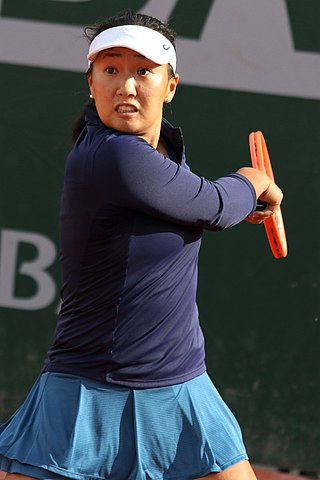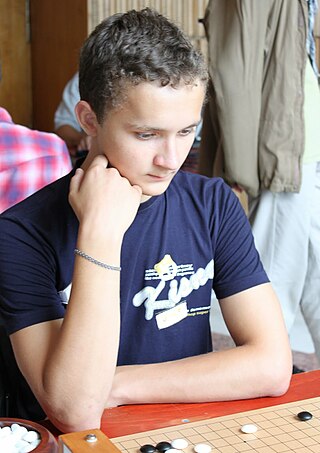Related Research Articles

Go is an abstract strategy board game for two players in which the aim is to surround more territory than the opponent. The game was invented in China more than 2,500 years ago and is believed to be the oldest board game continuously played to the present day. A 2016 survey by the International Go Federation's 75 member nations found that there are over 46 million people worldwide who know how to play Go and over 20 million current players, the majority of whom live in East Asia.

A Go professional is a professional player of the game of Go. The minimum standard to acquire a professional diploma through one of the major Go organisations is very high. The competition is tremendous, and prize incentives for champion players are very large. For example, the Honinbo Tournament has a grand prize of about $350,000.

The rules of Go have seen some variation over time and from place to place. This article discusses those sets of rules broadly similar to the ones currently in use in East Asia. Even among these, there is a degree of variation.
The Grand Slam in tennis is the achievement of winning all four major championships in one discipline in a calendar year, also referred to as the "Calendar-year Grand Slam" or "Calendar Slam". In doubles, a team may accomplish the Grand Slam playing together or a player may achieve it with different partners. Winning all four major championships consecutively but not within the same calendar year is referred to as a "non-calendar-year Grand Slam", while winning the four majors at any point during the course of a career is known as a "Career Grand Slam".

The Nihon Ki-in (日本棋院), also known as the Japan Go Association, is the main organizational body for Go in Japan, overseeing Japan's professional system and issuing diplomas for amateur dan rankings. It is based in Tokyo. The other major Go association in Japan is Kansai Ki-in. Its innovations include the Oteai system of promotion, time limits in professional games, and the introduction of issuing diplomas to strong amateur players, to affirm their ranks.

Esports, short for electronic sports, is a form of competition using video games. Esports often takes the form of organized, multiplayer video game competitions, particularly between professional players, individually or as teams. Although organized competitions have long been a part of video game culture, these were largely between amateurs until the late 2000s, when participation by professional gamers and spectatorship in these events through live streaming saw a large surge in popularity. By the 2010s, esports was a significant factor in the video game industry, with many game developers actively designing and providing funding for tournaments and other events.

The International Tennis Federation (ITF) is the governing body of world tennis, wheelchair tennis, and beach tennis. It was founded in 1913 as the International Lawn Tennis Federation by twelve national tennis associations. As of 2016, there are 211 national and six regional associations that make up the ITF's membership.

World Taekwondo, called the World Taekwondo Federation until June 2017, is an international federation governing the sport of taekwondo and is a member of the Association of Summer Olympic International Federations (ASOIF).

There are various systems of Go ranks and ratings that measure the skill in the traditional board game Go. Traditionally, Go rankings have been measured using a system of dan and kyu ranks. Especially in amateur play, these ranks facilitate the handicapping system, with a difference of one rank roughly corresponding to one free move at the beginning of the game. This system is also commonly used in many East Asian martial arts, where it often corresponds with a belt color. With the ready availability of calculators and computers, rating systems have been introduced. In such systems, a rating is rigorously calculated on the basis of game results.
Komi (コミ) in the game of Go are points added to the score of the player with the white stones as compensation for playing second. The value of Black's first-move advantage is generally considered to be between 5 and 7 points by the end of the game.

There are many variations of the simple rules of Go. Some are ancient digressions, while other are modern deviations. They are often side events at tournaments, for example, the U.S. Go Congress holds a "Crazy Go" event every year.
The U.S. Go Congress is the largest annual Go event in the United States, first held in 1985 and now into its 35th consecutive year. It is organized by the American Go Association in conjunction with one or more local clubs, and is a week-long tournament and learning opportunity for Go players. Several hundred people generally attend, including a number of professional players. A few major tournaments are incorporated into the week, including the U.S. Open and the North American Masters (NAMT) tournament.

The International Go Federation (IGF) is an international organization that connects the various national Go federations around the world.
Pandanet, located in Tokyo, Japan, is a server that allows players of the game of Go to observe and play against others over the Internet. Started February 2, 1992, by Tim Casey, Chris Chisolm, and Mark Okada, working out of the University of New Mexico, and until April 5, 1993, continued at the University of California, Berkeley, and UC San Francisco, it was the first server of its kind. After its initial inception some of its members helped to improve the server by writing software with a graphical interface; and thus IGS was born. Pandanet hosts up to 3,000 players at a time, depending on the time of day. Its PC client's name is GoPanda.
The European Go Federation (EGF) is a non-profit organization with the purpose of encouraging, regulating, co-ordinating, and disseminating the playing of the board game Go in Europe. The EGF was founded in 1957, the same year that the inaugural European Go Congress (EGC) took place in Cuxhaven, Germany. The Congress has been an annual event every year since then, held each time in a different European city. The European Go Championship takes place during the EGC, as well as the Annual General Meeting (AGM). In 2014, the European Professional System was established by the European Go Federation.

The 2015 ATP World Tour was the global elite professional tennis circuit organized by the Association of Tennis Professionals (ATP) for the 2015 tennis season. The 2015 ATP World Tour calendar comprises the Grand Slam tournaments, the ATP World Tour Masters 1000, the ATP World Tour 500 series, the ATP World Tour 250 series, the Davis Cup and the ATP World Tour Finals. Also included in the 2015 calendar is the Hopman Cup, which is organized by the ITF and does not distribute ranking points.

Claire Liu is an American professional tennis player. On 24th October 2022, she reached her career-high singles ranking of world No. 60 by the Women's Tennis Association.
The Australian Go Association (AGA) is the national governing body for the ancient oriental sport of go in the country of Australia. It was founded in 1978 by Clive Davies of the Sydney Go Club, Neville Smythe of the Canberra Go Club, and Bill Leveritt of the Brisbane Go Club, joined in 1982 by Melbourne and some year after that by Adelaide. The Association is the Australian member of the International Go Federation. With the New Zealand Go Society it makes up the Oceania zone of the IGF and thus shares one seat on the IGF's board of directors. The aims of the association are:

Mgr. Pavol Lisý was the first professional go player certified by the European Go Federation.

Artem Volodymyrovych Kachanovskyi is a 2-dan professional go player from Ukraine. He was the fifth player to be awarded professional status by the European Go Federation, in 2016. He has won the European Grand Slam tournament twice, in 2017 and 2021, and was runner-up in the European Championship four times, in 2010, 2019, 2021 and 2022. He placed third in the 2013 World Amateur Go Championship, an achievement shared by only two other European players. Among other high tournament placements, he was part of the winning team in the Pandanet European Team Championship in 2016 and 2022, and won the Silk Road Tournament in 2019 and the first season of the European Professional Go League in 2020.
References
- ↑ Laird, Roy (2001). "Go in America - a history of the American Go Association" (PDF). The Proceedings of the First International Conference on Go. Department of Go Studies, Myongji University, Seoul, Korea, 5-11-12. Archived from the original (PDF) on July 18, 2011. Retrieved 28 November 2012.
- ↑ "A Gift Between Nations - Frank's Board". trianglegoclub.org. 27 November 2009. Retrieved 1 January 2015.
- ↑ "GO IN THE NEWS: Carrboro Carpenter Crafts Go Board for Obama Gift". usgo.org. 14 December 2009. Retrieved 1 January 2015.
- 1 2 3 4 "AGA Professional System". usgo.org. Retrieved 3 March 2015.
- ↑ "Andy Liu 1p Wins Exchange Match, Plays in Sankei Cup Game Sunday Night". usgo.org. Retrieved 24 July 2016.
- ↑ "New AGA Pro To Play in First Korean Tournament". usgo.org. Retrieved 24 July 2016.
- ↑ "AGA and CGA announce the North American Go Federation". American Go E-Journal. 2021-02-06.
- ↑ "Gangsheng Shi Wins to Join Andy Liu as First AGA Profesionals". 2012. Retrieved 11 January 2015.
- ↑ "Calvin Sun Edges Out Bill Lin in Dramatic Final to Win AGA Pro Tourney". 2014. Retrieved 11 January 2015.
- ↑ Garlock, Chris (2015). "Ryan Li Sweeps Final to Win 2015 AGA Pro Victory" . Retrieved 11 January 2015.
- ↑ "AGA Professional Results 2015".
- ↑ "North American Pro Qualification 2022". 2022. Retrieved 1 July 2022.
- ↑ "Pandanet-AGA City League Rules Year 3". Pandanet. October 7, 2014. Retrieved October 25, 2017.